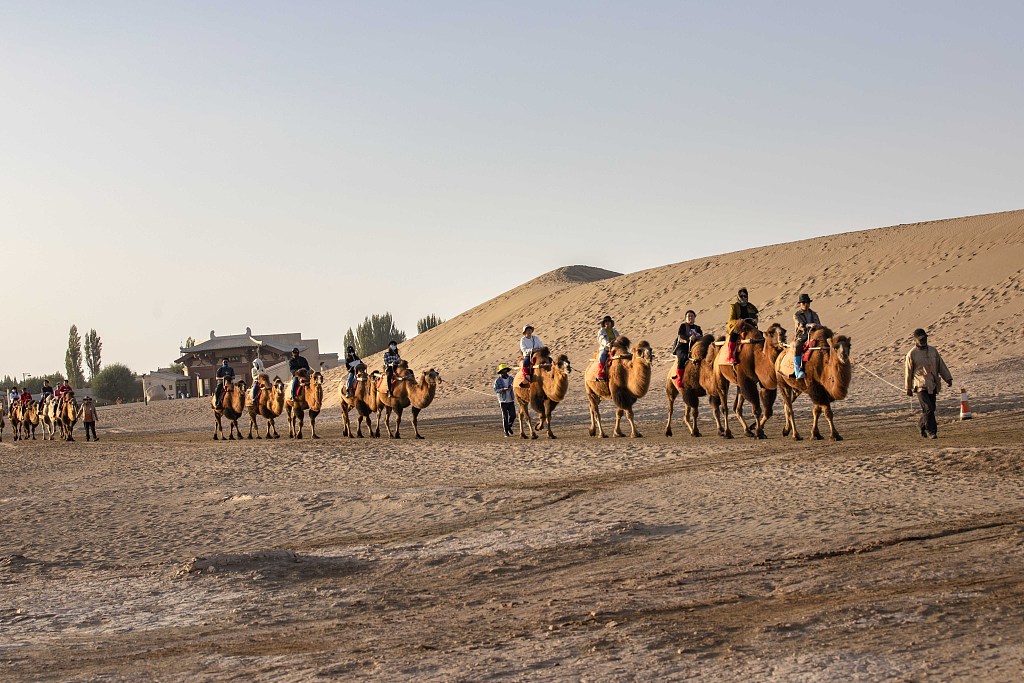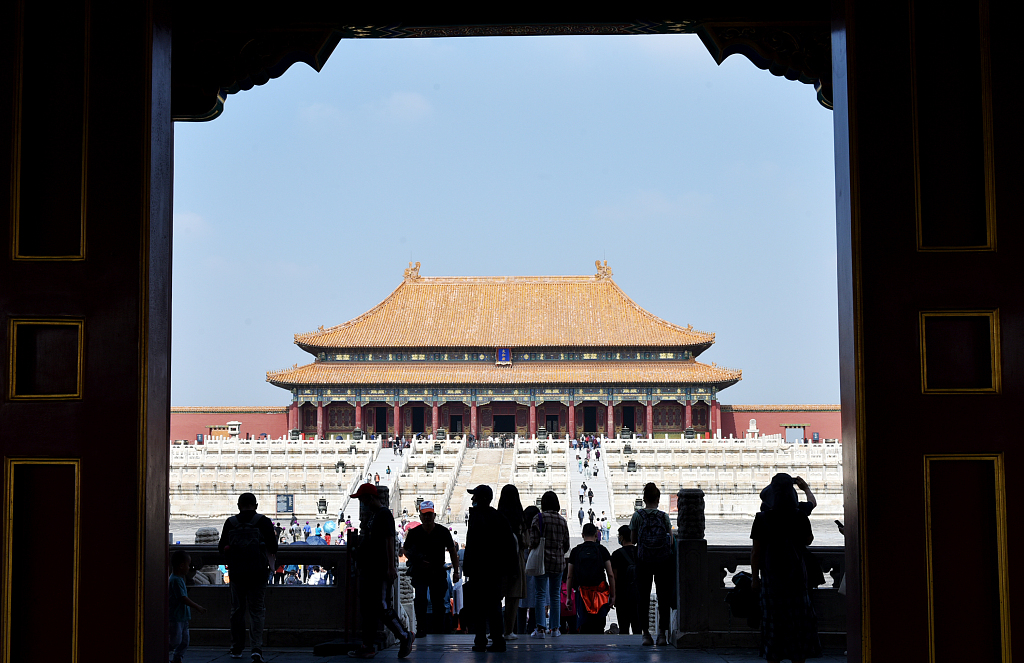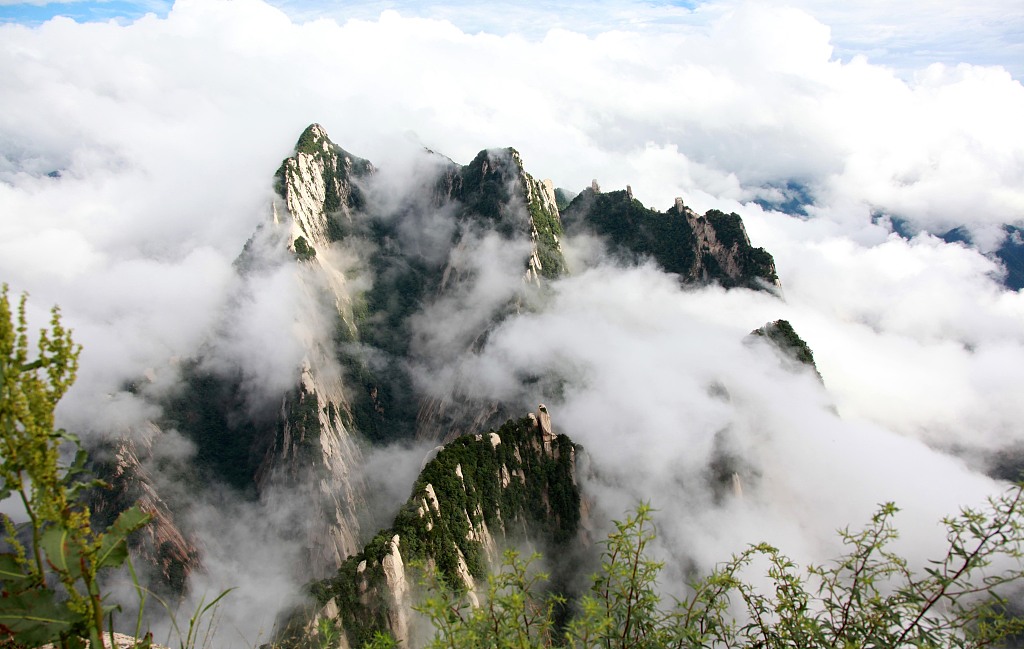With Mid-Autumn Festival and National Day approaching, some popular scenic attractions in China, such as the Palace Museum, are already booked up for the holiday, while other attractions are selling out fast. The authorities suggest that tourists pay attention to their safety and check ticket reservations have been confirmed before traveling.
Scenic attractions have increased capacity for visitors
Because Mid-Autumn Festival coincides with the National Day holiday in 2020, this year's Golden Week holiday is one day longer than usual, and the eight-day holiday has made Chinese tourists even more eager to go out.
China State Railway Group said on Monday that the National Day railway rush will start on September 28. From September 28 to October 8, China's railways are expected to carry 108 million passengers, an average of 9.82 million per day.

Tourists visit the Mingsha Mountain and Crescent Moon Spring in Dunhuang City, northwest China's Gansu Province, September 24, 2020. /CFP
Tourists visit the Mingsha Mountain and Crescent Moon Spring in Dunhuang City, northwest China's Gansu Province, September 24, 2020. /CFP
October 1 will be the peak, with an estimated 13 million passengers on the rails, the highest daily passenger flow since the outbreak of the pandemic, the group said.
In order to meet the needs of tourists, the Ministry of Culture and Tourism has lifted the upper limit for visitors at cultural and tourist locations from 50 percent to 75 percent of capacity.
According to a notice released by the authority of Mount Huashan scenic area on September 28, the daily maximum passenger flow limit will be 20,000 and ticket sales will be stopped when the limit is reached.
Meanwhile, starting from September 28, the maximum daily capacity for visitors to Mount Huangshan has been expanded from 25,000 to 37,500.
From September 25, the Mogao Caves in Dunhuang City also raised the maximum daily limit of each ticket type to 75 percent of the normal capacity.
Tickets to popular attractions are hard to get
The eight-day Golden Week has inspired people to travel. Some scenic attractions are already booked up, with popular spots such as the Palace Museum selling out from October 1 to 8.

Tourists visit the Palace Museum, Beijing, China, September 26, 2020. /CFP
Tourists visit the Palace Museum, Beijing, China, September 26, 2020. /CFP
Tickets for the Jiuzhaigou Sparkling Lake in Sichuan Province from October 2 to 4 have also sold out.
The ministry urged travelers to book tickets to scenic spots in advance.
Shan Gangxin, deputy head of the Ministry of Culture and Tourism's resource development department, said that tourism sites should be opened and tickets booked in an orderly manner under the premise of overall prevention and control of the pandemic.
The ministry also reminded tourists to understand and inquire in advance about epidemic prevention and control measures, opening hours, ticket reservations and passenger flow restrictions so as to ensure "no booking, no travel."

Mount Huashan scenic area located near the city of Huayin in Shaanxi Province. /CFP
Mount Huashan scenic area located near the city of Huayin in Shaanxi Province. /CFP
For example, the Mount Huashan scenic area in northwest China's Shaanxi Province requires all tourists to register with the Shaanxi Health Code before booking tickets. Those with a green health code can book tickets, while those with a yellow or red code cannot.
The Mount Huangshan scenic area in east China's Anhui Province also requires visitors to show a successful test or a matching ID card with health code and undertake a temperature test before entering the scenic area.
Minimize 'unnecessary outbound travel'
The Department of Consular Affairs of the Ministry of Foreign Affairs reminded Chinese citizens to pay close attention to security alerts and overseas epidemic information issued by the Ministry of Foreign Affairs and its embassies and consulates. It also urged travelers to fully assess the serious risks of cross-infection and the long quarantine period brought by international travel and minimize "unnecessary travel."
(Cover image from CFP)